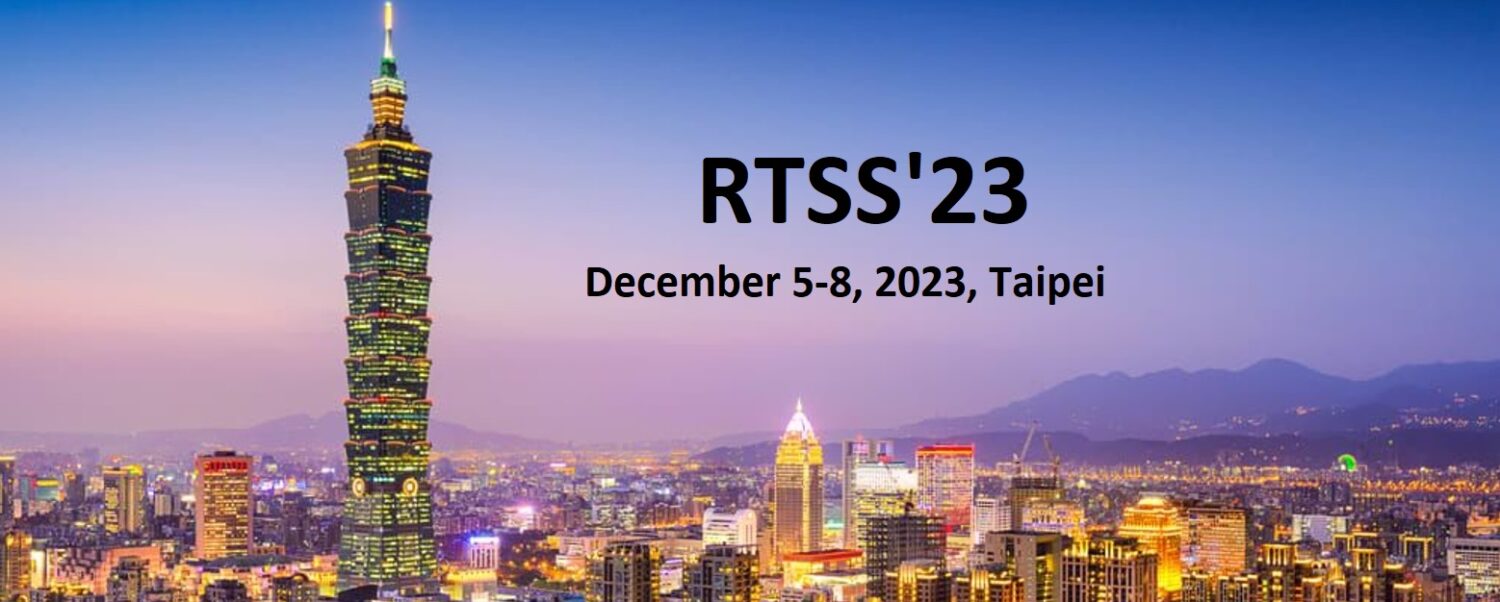Call for Brief Presentations
The Brief Presentations (BP) Track provides a platform for researchers to present their work in progress and/or introduce relevant publications from journals or other sources to the real-time systems community. In the RTSS’23 BP track, we welcome two types of submissions:
- Work-in-Progress (WiP) papers.
- Work-already-Published (WaP), a.k.a. Journals-never-Presented, papers.
The BP track shares the technical scope with RTSS 2023.
The BP track will take place during the main conference.
For all accepted contributions (WiP and WaP) in the BP track, at least one author must:
- be registered for the conference,
- present the work during the RTSS’23 BP session, and
- display a poster of the work.
If the conference takes a hybrid format and the authors of a BP paper are unable to attend physically, the third requirement (poster presentation) is not obligatory.
Work-in-Progress (WiP) Papers
WiP submissions should focus primarily on ongoing, unpublished work that discusses evolving and early-stage ideas, explores new research directions, and highlights current trends in the field. Acceptance of these submissions will be based on their originality, quality, significance, and relevance to RTSS. WiP submissions should be in the form of concise papers, limited to a maximum of 4 pages.
Accepted WiP papers will be included in the main RTSS proceedings, which will be published by IEEE.
Work-already-Published (WaP) Papers
WaP submissions should consist of an extended abstract, limited to a maximum of 2 pages, of a previously published paper. The abstract should explain the relevance of the work to RTSS and include clear references to the original summarized publication. The purpose of the WaP presentations in the BP session is to raise awareness of work that has been published elsewhere but may not be widely known to RTSS participants. In addition, the track aims to highlight recent contributions to the real-time systems community that have appeared in journals without having been previously presented at a conference.
For a paper to qualify for presentation as a WaP, it must meet the following criteria:
- The paper should be recent and should have been published in a journal related to real-time systems.
- The paper should not have been presented at another conference before.
Accepted WaP papers will not appear in print at the conference because they have already been published elsewhere.
Important Dates
Paper submission deadline: September 6 September 13, 2023 (AoE)
Notification of acceptance: September 30, 2023 (AoE)
Camera-ready submission: October 9, 2023
Submission Instructions
- Each paper should clearly indicate the name of the author(s) on the first page.
- The WiP submission should be a maximum of 4 pages, including all references and appendices, and should describe an original ongoing work. Please ensure that the title reads as follows: “Work-in-Progress: Title of Paper”.
- The WaP submission should consist of an extended abstract, limited to 2 pages, and must include clear references to the authors’ previously published original work. Please ensure that the title reads as follows: “Work-already-Published: Title of Paper”.
- The submitted paper must adhere to the page limit specified, including all references and appendices. Submissions that exceed the page limit will not be reviewed.
Each paper (WiP/WaP) should be submitted as a single PDF document that conforms to the standard IEEE format used for the main conference. The document should be formatted with single-spacing, double-column layout, and a 10-point font size.
Templates are available at: http://www.ieee.org/conferences_events/conferences/publishing/templates.html
Paper Submission Page
Link: https://softconf.com/n/rtss23-bp
Brief-Presentation Chair
Arpan Gujarati, University of British Columbia, Vancouver, Canada.
Patrick Meumeu Yomsi, CISTER Research Centre, Polytechnic Institute of Porto, Portugal.
Technical Program Committee
Daniel Casini, Scuola Superiore Sant’Anna – Pisa, Italy
Filip Markovic, Max Planck Institute for Software Systems (MPI-SWS), Germany
Konstantinos Bletsas, CISTER/ISEP, Portugal
Jing Li, New Jersey Institute of Technology, USA
Enrico Bini, Università degli Studi di Torino, Italy
Abhishek Singh, Washington University in St. Louis, USA
Sims Osborne, Elon University, USA
Jong-Chan Kim, Kookmin University, South Korea
Soumyajit Dey, Indian Institute of Technology Kharagpur, India
Yehan Ma, Shanghai Jiao Tong University, China
Sathish Gopalakrishnan, University of British Columbia, Canada
Flavia Nascimento, Federal Institute of Bahia, Brazil
Borislav Nikolic, Univerzitet Metropolitan Beograd, Serbia
If you have any questions, please don’t hesitate to contact the BP Co-Chairs: Arpan Gujarati (arpanbg@cs.ubc.ca) and Patrick Meumeu Yomsi (pmy@isep.ipp.pt).
